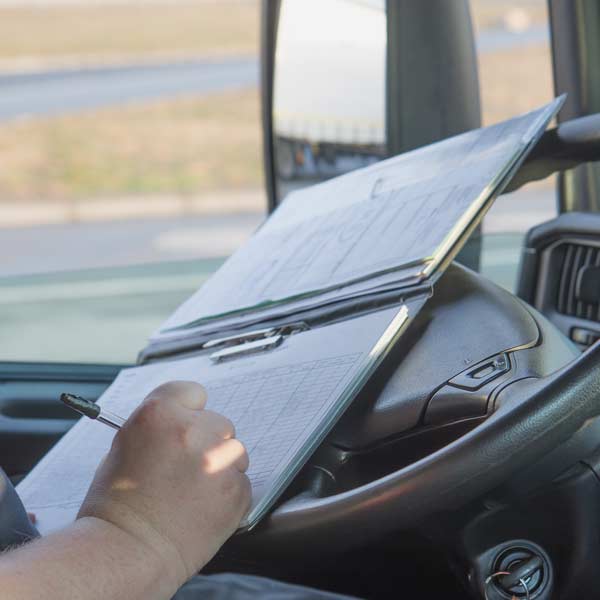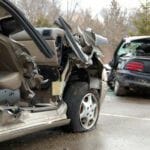Frequent Truck Safety Violations and Where to Report Them

April 15, 2019 / Truck Accidents
Any time you drive down a highway, you get a snapshot of the legions of commercial trucks that rumble across the nation, day and night. These behemoths dominate the other vehicles on the road, and it goes without saying that any accident involving one is bad news.
There is a government agency — The Federal Motor Carrier Safety Administration, or FMCSA — whose mission it is to regulate the trucking industry and prevent injuries and accidents through enforcing safety rules, improving technology, increasing awareness, and other measures.
Trucking companies and drivers are required to follow FMSCA’s regulations. If they don’t, endangering everyone on the road, they can be held legally responsible. Here are a few of the most common ways in which they break the law.
Hours-of-Service Violations
In 2014, a horrific crash that severely injured comedian and actor Tracy Morgan and killed comedy writer James McNair shed light on the dangers of truckers who violate hours-of-service rules. The driver of the truck that rear-ended their vehicle, the National Transportation Safety Board (NTSB) determined, had been on duty 13 ½ hours but awake for 28 hours at the time of the incident. According to the National Safety Council (NSC), driving after 20 hours of no sleep is as dangerous as driving with a blood-alcohol content of 0.08% — the legal limit.
The FMSCA has clear regulations designed to ensure that commercial drivers don’t drive for too many hours within a given time period and that they take adequate breaks.
Lax Maintenance
Every vehicle requires regular maintenance to run properly. But commercial trucks drive thousands of miles in short periods of time and carry heavy loads. Failure to keep these workhorses in excellent condition is likely to end in catastrophe. Weigh stations and roadside checks are one way to make sure trucks meet the Commercial Motor Vehicle Safety Alliance (CVSA) standards, but it’s the responsibility of the carrier to have a program in place for maintaining and inspecting their vehicles’ systems and ensuring they are safe. Drivers must be trained to conduct pre-trip checks, recognize impending brake problems, and keep tires inflated correctly.
Load and Cargo Violations
Federal law limits commercial vehicles traveling on interstate highways to a gross weight of 80,000 pounds. There are also detailed regulations in place on cargo and how it must be secured. Unfortunately, in Indiana, trucking companies have little incentive to follow the letter of the law. The maximum fine for an unsecured load in the state is a wimpy $500. This is not in line with the potentially devastating consequences of poorly tied-down freight. It can fly off, hitting other cars or causing drivers to swerve dangerously.
Hiring Violations
Given that the industry is facing a reported shortage of 50,000 drivers, it may be tempting for carriers to hire people who have no business operating commercial vehicles. According to current regulations, truck drivers must be at least 21 years old, have a commercial driver’s license (CDL) and be able to speak English, among other requirements. They should have a good driving record and no history of DUI or other issues that could compromise their ability to drive safely.
How Do I Report Problems?
Do you have reason to believe a trucking company is compromising road safety with any of the above-mentioned violations? If so, contact the FMCSA immediately. Call them at 1-888-DOT-SAFT (368-7238), from 8 a.m to 8 p.m., Monday through Friday, or submit an online complaint.
Call a Truck Accident Lawyer
If you or a family member has been hurt in an accident and you believe a commercial truck driver and/or company is to blame, you want an attorney who will fight for you, so call Stephenson Rife. Mike Stephenson is an experienced Indianapolis truck accident lawyer with a demonstrated history of wins for his clients. He knows the ins and outs of federal and Indiana law regarding commercial vehicles, isn’t afraid to stand up to the big carriers, and goes in to win, not settle, if that’s in his client’s best interests. Get in touch with us online or give us a call.

 Mike Stephenson has 40 years of experience and is a trusted advisor to many individuals and companies. His current practice is dominated by civil litigation in state and federal courts. He focuses much of his time on handling catastrophic injuries caused by all types of accidents, including motor vehicle, trucking, workplace injuries, product liability, and fire, just to name a few. He also works extensively in construction accidents. [
Mike Stephenson has 40 years of experience and is a trusted advisor to many individuals and companies. His current practice is dominated by civil litigation in state and federal courts. He focuses much of his time on handling catastrophic injuries caused by all types of accidents, including motor vehicle, trucking, workplace injuries, product liability, and fire, just to name a few. He also works extensively in construction accidents. [ 